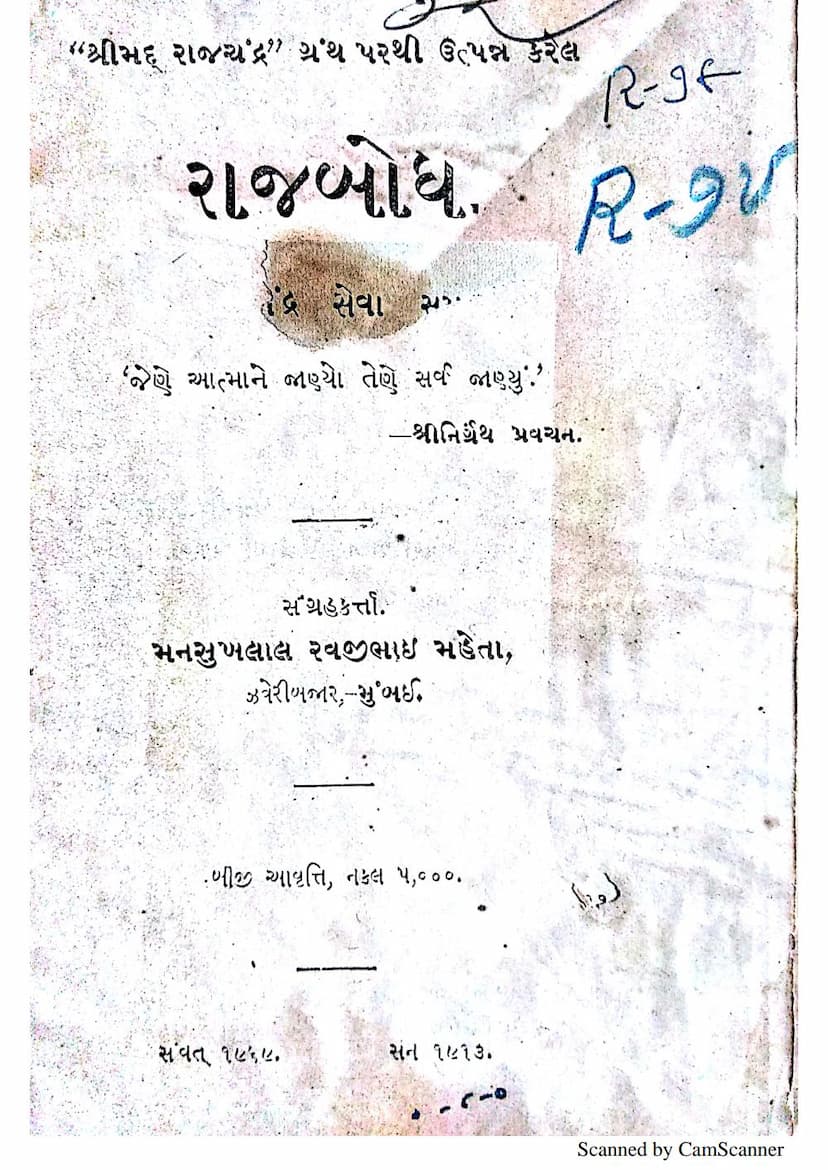Rajbodh
Added to library: September 2, 2025

Summary
This document, titled "Rajbodh" (RAJBODH), compiled by Mansukhlal Ravjibhai Mehta, is a collection of teachings and philosophies derived from the works of Shrimad Rajchandra, a prominent Jain saint and philosopher. The book aims to provide spiritual guidance and insights for personal reflection and practice, particularly within the Jain tradition.
Key Themes and Content:
The book is structured into numerous sections, each exploring various aspects of spiritual life, ethics, and Jain philosophy. Here's a breakdown of the recurring themes and ideas:
- The Essence of True Knowledge and Self-Realization: A central tenet is that knowing the soul (Atma) leads to knowing everything. True understanding comes from within, through introspection and self-awareness.
- Vairagya (Dispassion/Renunciation): Throughout the text, there's a strong emphasis on cultivating dispassion towards worldly pleasures, possessions, and attachments. This is presented as essential for spiritual progress.
- The Impermanence of the Worldly Life: Many passages highlight the transient nature of life, wealth, relationships, and physical beauty. This serves as a motivation for seeking eternal truths.
- The Path to Moksha (Liberation): The ultimate goal is liberation from the cycle of birth and death. This is achieved through spiritual practices, right knowledge, right conduct, and right faith, as taught in Jainism.
- The Importance of the Soul (Atma): The soul is described as the true self, eternal, pure, and inherently blissful. The focus is on realizing this true nature and detaching from the non-soul elements.
- Ethical Conduct and Virtues: The text stresses the importance of virtues like compassion (Daya), truthfulness (Satya), forgiveness (Kshama), self-control (Sanyam), non-violence (Ahimsa), and detachment (Vairagya).
- The Nature of Suffering and Happiness: Worldly happiness is depicted as temporary and often leading to suffering, while true and lasting happiness (Anand) is found in the realization of the soul.
- The Role of Knowledge and Wisdom: True knowledge is not just intellectual but experiential. It leads to the understanding of the self and the universe, dispelling ignorance (Agnan).
- The Importance of Renouncing Ego and Attachment: The text consistently warns against ego (Ahankar), possessiveness (Mamata), and attachments to the external world as major impediments to spiritual growth.
- Discrimination between the Soul and Non-Soul (Atma-Anatma Vivek): A crucial concept is the ability to distinguish between the eternal, conscious soul and the transient, material world.
- The Role of the Guru and Scriptures: While emphasizing self-realization, the text also acknowledges the guidance of a true Guru and the wisdom contained in scriptures as important aids on the spiritual path.
- Practices and Meditations: Various practices are alluded to, including contemplation, meditation, and the cultivation of specific mental states and Bhavanas (contemplations).
- The Teachings of Shrimad Rajchandra: The compiler, Mansukhlal Ravjibhai Mehta, presents these teachings as selections from Shrimad Rajchandra's extensive works, aiming to make his profound spiritual insights accessible.
- Comparisons with Other Philosophers: The introduction mentions a comparison drawn by Mahatma Gandhi between Shrimad Rajchandra and Leo Tolstoy, highlighting Rajchandra's spiritual depth.
- Social Commentary and Context: The text also touches upon the state of the Jain community and society at the time of its compilation, emphasizing the need for spiritual revival and the overcoming of sectarian divisions.
Overall Message:
"Rajbodh" serves as a guide for a spiritual seeker, encouraging a life of introspection, ethical conduct, dispassion, and devotion to the realization of the soul. It emphasizes that the path to liberation is an internal one, requiring diligent effort, self-discipline, and unwavering faith in the teachings of enlightened beings. The book is a compilation of profound spiritual wisdom intended for personal study and practice, offering solace, guidance, and a path towards ultimate truth.